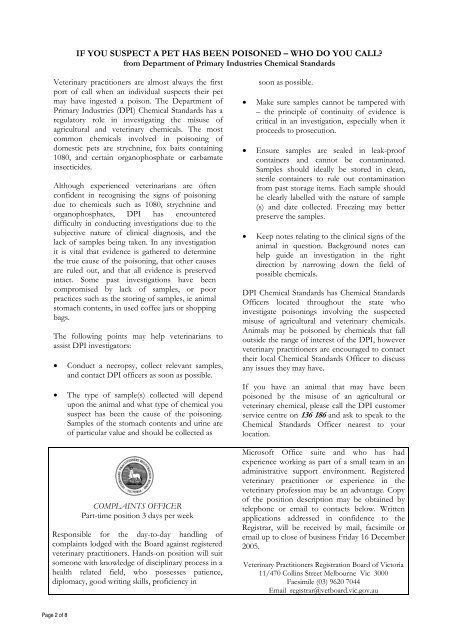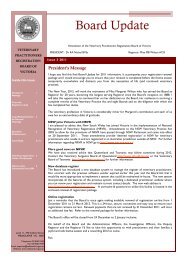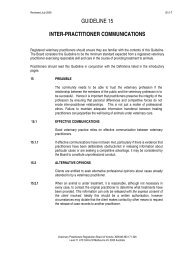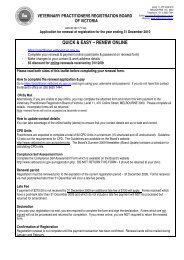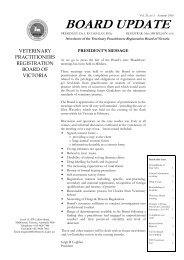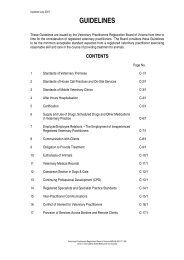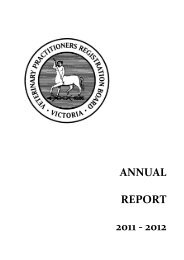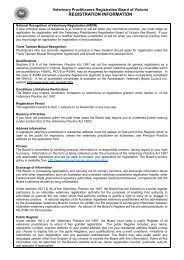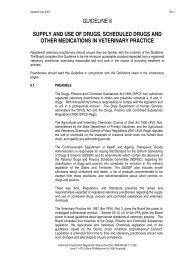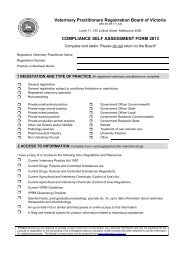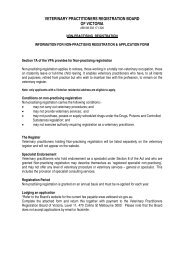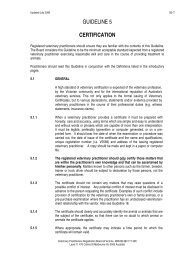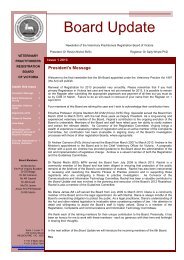board update - Veterinary Practitioners Registration Board of Victoria
board update - Veterinary Practitioners Registration Board of Victoria
board update - Veterinary Practitioners Registration Board of Victoria
You also want an ePaper? Increase the reach of your titles
YUMPU automatically turns print PDFs into web optimized ePapers that Google loves.
IF YOU SUSPECT A PET HAS BEEN POISONED – WHO DO YOU CALL?<br />
from Department <strong>of</strong> Primary Industries Chemical Standards<br />
<strong>Veterinary</strong> practitioners are almost always the first<br />
port <strong>of</strong> call when an individual suspects their pet<br />
may have ingested a poison. The Department <strong>of</strong><br />
Primary Industries (DPI) Chemical Standards has a<br />
regulatory role in investigating the misuse <strong>of</strong><br />
agricultural and veterinary chemicals. The most<br />
common chemicals involved in poisoning <strong>of</strong><br />
domestic pets are strychnine, fox baits containing<br />
1080, and certain organophosphate or carbamate<br />
insecticides.<br />
Although experienced veterinarians are <strong>of</strong>ten<br />
confident in recognising the signs <strong>of</strong> poisoning<br />
due to chemicals such as 1080, strychnine and<br />
organophosphates, DPI has encountered<br />
difficulty in conducting investigations due to the<br />
subjective nature <strong>of</strong> clinical diagnosis, and the<br />
lack <strong>of</strong> samples being taken. In any investigation<br />
it is vital that evidence is gathered to determine<br />
the true cause <strong>of</strong> the poisoning, that other causes<br />
are ruled out, and that all evidence is preserved<br />
intact. Some past investigations have been<br />
compromised by lack <strong>of</strong> samples, or poor<br />
practices such as the storing <strong>of</strong> samples, ie animal<br />
stomach contents, in used c<strong>of</strong>fee jars or shopping<br />
bags.<br />
The following points may help veterinarians to<br />
assist DPI investigators:<br />
• Conduct a necropsy, collect relevant samples,<br />
and contact DPI <strong>of</strong>ficers as soon as possible.<br />
• The type <strong>of</strong> sample(s) collected will depend<br />
upon the animal and what type <strong>of</strong> chemical you<br />
suspect has been the cause <strong>of</strong> the poisoning.<br />
Samples <strong>of</strong> the stomach contents and urine are<br />
<strong>of</strong> particular value and should be collected as<br />
COMPLAINTS OFFICER<br />
Part-time position 3 days per week<br />
Responsible for the day-to-day handling <strong>of</strong><br />
complaints lodged with the <strong>Board</strong> against registered<br />
veterinary practitioners. Hands-on position will suit<br />
someone with knowledge <strong>of</strong> disciplinary process in a<br />
health related field, who possesses patience,<br />
diplomacy, good writing skills, pr<strong>of</strong>iciency in<br />
soon as possible.<br />
• Make sure samples cannot be tampered with<br />
– the principle <strong>of</strong> continuity <strong>of</strong> evidence is<br />
critical in an investigation, especially when it<br />
proceeds to prosecution.<br />
• Ensure samples are sealed in leak-pro<strong>of</strong><br />
containers and cannot be contaminated.<br />
Samples should ideally be stored in clean,<br />
sterile containers to rule out contamination<br />
from past storage items. Each sample should<br />
be clearly labelled with the nature <strong>of</strong> sample<br />
(s) and date collected. Freezing may better<br />
preserve the samples.<br />
• Keep notes relating to the clinical signs <strong>of</strong> the<br />
animal in question. Background notes can<br />
help guide an investigation in the right<br />
direction by narrowing down the field <strong>of</strong><br />
possible chemicals.<br />
DPI Chemical Standards has Chemical Standards<br />
Officers located throughout the state who<br />
investigate poisonings involving the suspected<br />
misuse <strong>of</strong> agricultural and veterinary chemicals.<br />
Animals may be poisoned by chemicals that fall<br />
outside the range <strong>of</strong> interest <strong>of</strong> the DPI, however<br />
veterinary practitioners are encouraged to contact<br />
their local Chemical Standards Officer to discuss<br />
any issues they may have.<br />
If you have an animal that may have been<br />
poisoned by the misuse <strong>of</strong> an agricultural or<br />
veterinary chemical, please call the DPI customer<br />
service centre on 136 186 and ask to speak to the<br />
Chemical Standards Officer nearest to your<br />
location.<br />
Micros<strong>of</strong>t Office suite and who has had<br />
experience working as part <strong>of</strong> a small team in an<br />
administrative support environment. Registered<br />
veterinary practitioner or experience in the<br />
veterinary pr<strong>of</strong>ession may be an advantage. Copy<br />
<strong>of</strong> the position description may be obtained by<br />
telephone or email to contacts below. Written<br />
applications addressed in confidence to the<br />
Registrar, will be received by mail, facsimile or<br />
email up to close <strong>of</strong> business Friday 16 December<br />
2005.<br />
<strong>Veterinary</strong> <strong>Practitioners</strong> <strong>Registration</strong> <strong>Board</strong> <strong>of</strong> <strong>Victoria</strong><br />
11/470 Collins Street Melbourne Vic 3000<br />
Facsimile (03) 9620 7044<br />
Email registrar@vet<strong>board</strong>.vic.gov.au<br />
Page 2 <strong>of</strong> 8


